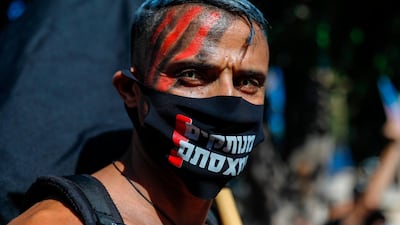Israeli Prime Minister Benjamin Netanyahu's corruption trial resumed on Sunday following a two-month hiatus.
Mr Netanyahu was not expected to appear at the hearing, which is taking place at a Jerusalem court and is mostly a procedural deliberation.
Mr Netanyahu is charged with fraud, breach of trust and accepting bribes in a series of scandals.
He is alleged to have received lavish gifts from billionaire friends and exchanged regulatory favours with media moguls for better coverage of himself and his family.
Mr Netanyahu denies wrongdoing, describing the accusations as a media-orchestrated witch-hunt pursued by a biased legal system.
Bribery charges carry a sentence of up to 10 years in jail and/or a fine. Fraud and breach of trust carry a prison sentence of up to three years.
The trial began in May. It resumes as Mr Netanyahu faces widespread discontent over his government's handling of the coronavirus crisis. Israelis have been increasingly taking to streets to demand his resignation.
After clinching a coalition deal three months ago with centrist Benny Gantz, his main rival in three inconclusive elections since April 2019, Mr Netanyahu took centre stage in ordering restrictions that flattened Israel's first wave of coronavirus infections.
But after a sharp rise in Covid-19 cases, high unemployment and reimposed coronavirus curbs in recent weeks, Israelis have taken to the streets in almost daily demonstrations against him, with public anger compounded by the corruption allegations.
On Saturday, police used water cannons to disperse demonstrators around Mr Netanyahu's Jerusalem residence. In Tel Aviv, Israel's commercial hub, thousands gathered to demand better state aid to businesses hurt in the health crisis.
Israel has seen nearly 50,000 virus cases since the outbreak began, with 406 deaths. More than 21,000 people have recovered.
Mr Netanyahu and his government have been criticised for a baffling, halting response to the new wave, which has seen daily cases rise to nearly 2,000. It has also been slammed for its handling of the economic fallout of the crisis.
While Israel has pledged billions of dollars worth of aid, it hasn't all been doled out to those in need, and a plan to give a stipend to all Israelis, even the wealthy, has been panned by the country's leading economists. The first and second round of restrictions has battered the economy and sent unemployment skyrocketing to more than 20 per cent, up from 3.9 per cent before the outbreak.
The anger has boiled over into protests over the past few week s that have culminated in violent clashes with police.
The protests haven't been on a massive scale, partly due to restrictions on large gatherings, but the rising frustration appears to be among the greatest challenges Mr Netanyahu has faced in his decade-plus in power.
The trial's resumption thus comes at inopportune timing for the long-serving leader. Mr Netanyahu had hoped to ride on the goodwill he gained from overcoming the first wave of infections going into his corruption trial but the increasingly souring mood has dropped his approval ratings and may deny him the public backing he had hoped for.
Although his base remains firmly behind him, only a smattering of supporters turned up outside the court to voice their backing for the prime minister, far fewer than the throngs who converged at the trial's opening.

